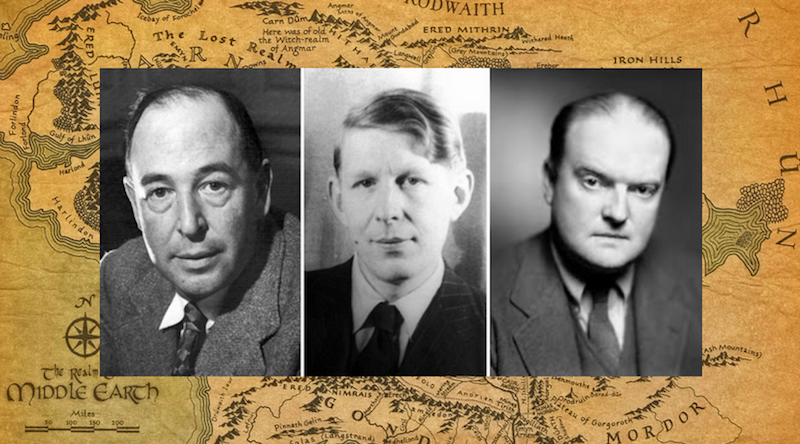
Ninety-two years ago today, J.R.R. Tolkien and C. S. Lewis—perhaps the two most famous fantasy writers of the 20th century—met for the first time. Introduced to one another at a faculty meeting at Oxford University, the pair bonded over a shared interest in Norse mythology and went on to become close friends, each aiding the other in the creation of his iconic fictional world. Tolkien counseled Lewis (whose engagement with Christian themes would prove vital to his writing) though a 1931 crisis of faith and in turn Lewis and his fellow Inklings (an informal group of Oxford literary enthusiasts that encouraged the writing of fantasy) took it upon themselves to promote Tolkien’s writing to a wider audience. Indeed, in a 1953 letter to British publisher Stanley Unwin regarding Tolkien’s The Fellowship of the Ring, Lewis wrote plainly, “I would willingly do all in my power to secure for Tolkien’s great book the recognition it deserves.” Perhaps the most public example of this support came in 1937, when Lewis (in a move which, though undeniably sweet, would probably be frowned upon today from an ethics-in-reviewing standpoint) reviewed his friend’s debut novel, The Hobbit:
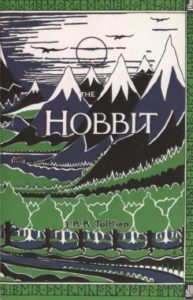
“To define the world of The Hobbit is, of course, impossible, because it is new. You cannot anticipate it before you go there, as you cannot forget it once you have gone. The author’s admirable illustrations and maps of Mirkwood and Goblingate and Esgaroth give one an inkling—and so do the names of the dwarf and dragon that catch our eyes as we first ruffle the pages. But there are dwarfs and dwarfs, and no common recipe for children’s stories will give you creatures so rooted in their own soil and history as those of Professor Tolkien—who obviously knows much more about them than he needs for this tale. Still less will the common recipe prepare us for the curious shift from the matter-of-fact beginnings of his story (‘hobbits are small people, smaller than dwarfs—and they have no beards—but very much larger than Lilliputians’) to the saga-like tone of the later chapters (‘It is in my mind to ask what share of their inheritance you would have paid to our kindred had you found the hoard unguarded and us slain’).
…
“You must read for yourself to find out how inevitable the change is and how it keeps pace with the hero’s journey. Though all is marvellous, nothing is arbitrary: all the inhabitants of Wilderland seem to have the same unquestionable right to their existence as those of our own world, though the fortunate child who meets them will have no notion—and his unlearned elders not much more—of the deep sources in our blood and tradition from which they spring.
…
“For it must be understood that this is a children’s book only in the sense that the first of many readings can be undertaken in the nursery. Alice is read gravely by children and with laughter by grown ups; The Hobbit, on the other hand, will be funnier to its youngest readers, and only years later, at a tenth or a twentieth reading, will they begin to realise what deft scholarship and profound reflection have gone to make everything in it so ripe, so friendly, and in its own way so true. Prediction is dangerous: but The Hobbit may well prove a classic.”
–C. S. Lewis, The Times Literary Supplement, October 2, 1937 (Paris Review link)
*
Still, Lewis wasn’t the only famous author of his day to find themselves smitten by Tolkien’s wondrous new world. Pulitzer Prize-winning English-American poet W. H. Auden—himself one of the leading literary lights of the era—penned not one but two glowing New York Times reviews of The Lord of the Rings trilogy in as many years:
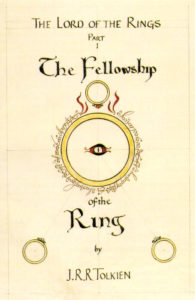
“Seventeen years ago there appeared, without any fanfare, a book called The Hobbit which, in my opinion, is one of the best children’s stories of this century. In The Fellowship of the Ring, which is the first volume of a trilogy, J. R. R. Tolkien continues the imaginative history of the imaginary world to which he introduced us in his earlier book but in a manner suited to adults, to those, that is, between the ages of 12 and 70. For anyone who likes the genre to which it belongs, the Heroic Quest, I cannot imagine a more wonderful Christmas present. All Quests are concerned with some numinous Object, the Waters of Life, the Grail, buried treasure etc.; normally this is a good Object which it is the Hero’s task to find or to rescue from the Enemy, but the Ring of Mr. Tolkien’s story was made by the Enemy and is so dangerous that even the good cannot use it without being corrupted.
…
The first thing that one asks is that the adventure should be various and exciting; in this respect Mr. Tolkien’s invention is unflagging, and, on the primitive level of wanting to know what happens next, The Fellowship of the Ring is at least as good as The Thirty-Nine Steps. Of any imaginary world the reader demands that it seem real, and the standard of realism demanded today is much stricter than in the time, say, of Malory. Mr. Tolkien is fortunate in possessing an amazing gift for naming and a wonderfully exact eye for description; by the time one has finished his book one knows the histories of Hobbits, Elves, Dwarves and the landscape they inhabit as well as one knows one’s own childhood.
Lastly, if one is to take a tale of this kind seriously, one must feel that, however superficially unlike the world we live in its characters and events may be, it nevertheless holds up the mirror to the only nature we know, our own; in this, too, Mr. Tolkien has succeeded superbly, and what happened in the year of the Shire 1418 in the Third Age of Middle Earth is not only fascinating in A. D. 1954 but also a warning and an inspiration. No fiction I have read in the last five years has given me more joy than The Fellowship of the Ring.”
–W. H. Auden, The New York Times, October 31, 1954
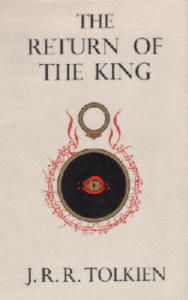
“In The Return of the King, Frodo Baggins fulfills his Quest, the realm of Sauron is ended forever, the Third Age is over and J. R. R. Tolkien’s trilogy The Lord of the Rings complete. I rarely remember a book about which I have had such violent arguments. Nobody seems to have a moderate opinion: either, like myself, people find it a masterpiece of its genre or they cannot abide it, and among the hostile there are some, I must confess, for whose literary judgment I have great respect. A few of these may have been put off by the first forty pages of the first chapter of the first volume in which the daily life of the hobbits is described; this is light comedy and light comedy is not Mr. Tolkien’s forte. In most cases, however, the objection must go far deeper. I can only suppose that some people object to Heroic Quests and Imaginary Worlds on principle; such, they feel, cannot be anything but light ‘escapist’ reading. That a man like Mr. Tolkien, the English philologist who teaches at Oxford, should lavish such incredible pains upon a genre which is, for them, trifling by definition, is, therefore, very shocking.
…
“If, as I believe, Mr. Tolkien has succeeded more completely than any previous writer in this genre in using the traditional properties of the Quest, the heroic journey, the Numinous Object, the conflict between Good and Evil while at the same time satisfying our sense of historical and social reality, it should be possible to show how he has succeeded. To begin with, no previous writer has, to my knowledge, created an imaginary world and a feigned history in such detail. By the time the reader has finished the trilogy, including the appendices to this last volume, he knows as much about Tolkien’s Middle Earth, its landscape, its fauna and flora, its peoples, their languages, their history, their cultural habits, as, outside his special field, he knows about the actual world.
Mr. Tolkien’s world may not be the same as our own: it includes, for example, elves, beings who know good and evil but have not fallen, and, though not physically indestructible, do not suffer natural death. It is afflicted by Sauron, an incarnate of absolute evil, and creatures like Shelob, the monster spider, or the orcs who are corrupt past hope of redemption. But it is a world of intelligible law, not mere wish; the reader’s sense of the credible is never violated.
…
“The demands made on the writer’s powers in an epic as long as The Lord of the Rings are enormous and increase as the tale proceeds-the battles have to get more spectacular, the situations more critical, the adventures more thrilling-but I can only say that Mr. Tolkien has proved equal to them. From the appendices readers will get tantalizing glimpses of the First and Second Ages. The legends of these are, I understand, already written and I hope that, as soon as the publishers have seen The Lord of the Rings into a paper-back edition, they will not keep Mr. Tolkien’s growing army of fans waiting too long.”
–W. H. Auden, The New York Times, January 22, 1956
*
Of course, not all the reviewers were as charmed by Tolkien’s wild imaginings as Messrs. Lewis and Auden. Edmund Wilson, whose ferocity of intellect and demeanor was then legendary, and who some have dubbed America’s Greatest Reader, had this to say (in what may be the quintessential killjoy review) of Frodo Baggins’ odyssey:
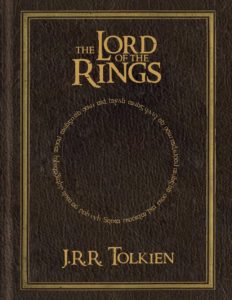
“The reviewer has just read the whole thing aloud to his seven-year old daughter, who has been through The Hobbit countless times, beginning it again the moment she has finished, and whose interest has been held by its more prolix successors. One is puzzled to know why the author should have supposed he was writing for adults. There are, to be sure, some details that are a little unpleasant for a children’s book, but except when he is being pedantic and also boring the adult reader, there is little in The Lord of the Rings over the head of a seven-year-old child. It is essentially a children’s book —a children’s book which has somehow got out of hand, since, instead of directing it at the juvenile market, the author has indulged himself in developing the fantasy for its own sake … Certainly it has no allegorical intentions, general, particular or topical, moral, religious or political. An overgrown fairy story, a philological curiosity—that is, then, what The Lord of The Rings really is. The pretentiousness is all on the part of Dr. Tolkien’s infatuated admirers, and it is these pretensions that I would here assail.
The most distinguished of Tolkien’s admirers and the most conspicuous of his defenders has been Mr. W. H. Auden. That Auden is a master of English verse and a well-equipped critic of verse, no one, as they say, will dispute. It is significant, then, that he comments on the badness of Tolkien’s verse—there is a great deal of poetry in The Lord of the Rings. Mr. Auden is apparently quite insensitive—through lack of interest in the other department—to the fact that Tolkien’s prose is just as bad. Prose and verse are on the same level of professorial amateurishness. What I believe has misled Mr. Auden is his own special preoccupation with the legendary theme of the Quest.
…
“Dr. Tolkien has little skill at narrative and no instinct for literary form. The characters talk a story-book language that might have come out of Howard Pyle, and as personalities they do not impose themselves. At the end of this long romance, I had still no conception of the wizard Gandalph, who is a cardinal figure, had never been able to visualize him at all. For the most part such characterizations as Dr. Tolkien is able to contrive are perfectly stereotyped: Frodo the good little Englishman, Samwise, his dog-like servant, who talks lower-class and respectful, and never deserts his master. These characters who are no characters are involved in interminable adventures the poverty of invention displayed in which is, it seems to me, almost pathetic.
…
“Now, how is it that these long-winded volumes of what looks to this reviewer like balderdash have elicited such tributes as those above? The answer is, I believe, that certain people—especially, perhaps, in Britain—have a lifelong appetite for juvenile trash. They would not accept adult trash, but, confronted with the pre-teen-age article, they revert to the mental phase which delighted in Elsie Dinsmore and Little Lord Fauntleroy and which seems to have made of Billy Bunter, in England, almost a national figure. You can see it in the tone they fall into when they talk about Tolkien in print: they bubble, they squeal, they coo; they go on about Malory and Spenser—both of whom have a charm and a distinction that Tolkien has never touched.
As for me, if we must read about imaginary kingdoms, give me James Branch Cabell’s Poictesme. He at least writes for grown-up people, and he does not present the drama of life as a showdown between Good People and Goblins. He can cover more ground in an episode that lasts only three pages than Tolkien is able to in one of this twenty-page chapters, and he can create a more disquieting impression by a reference to something that is never described than Tolkien through his whole demonology.”
–Edmund Wilson, The Nation, April 14, 1956
*
To close, it only seems fair to give the final words to Tolkien himself:
On renown:
“Being a cult figure in one’s own lifetime I am afraid is not at all pleasant. However I do not find that it tends to puff one up: in my case at any rate it makes me feel extremely small and inadequate. But even the nose of a very modest idol cannot remain entirely untickled by the sweet smell of incense.”
On myths:
“We have come from God, and inevitably the myths woven by us, though they contain error, will also reflect a splintered fragment of the true light, the eternal truth that is with God. Indeed only by myth-making, only by becoming ‘sub-creator’ and inventing stories, can Man aspire to the state of perfection that he knew before the Fall. Our myths may be misguided, but they steer however shakily towards the true harbour, while materialistic ‘progress’ leads only to a yawning abyss and the Iron Crown of the power of evil.”
On being a hobbit:
“I am in fact a hobbit in all but size. I like gardens, trees, and unmechanized farmlands; I smoke a pipe, and like good plain food (unrefrigerated), but detest French cooking; I like, and even dare to wear in these dull days, ornamental waistcoats. I am fond of mushrooms (out of a field); have a very simple sense of humour (which even my appreciative critics find tiresome); I go to bed late and get up late (when possible). I do not travel much.”
If you buy books linked on our site, Lit Hub may earn a commission from Bookshop.org, whose fees support independent bookstores.

